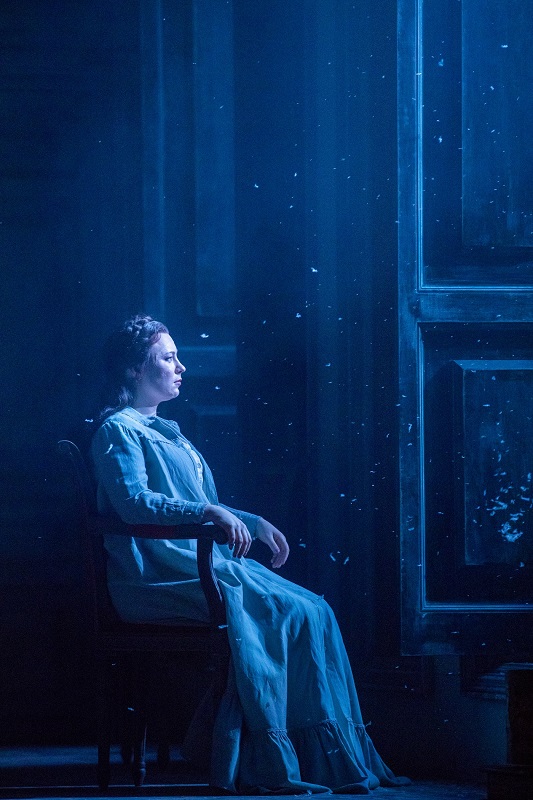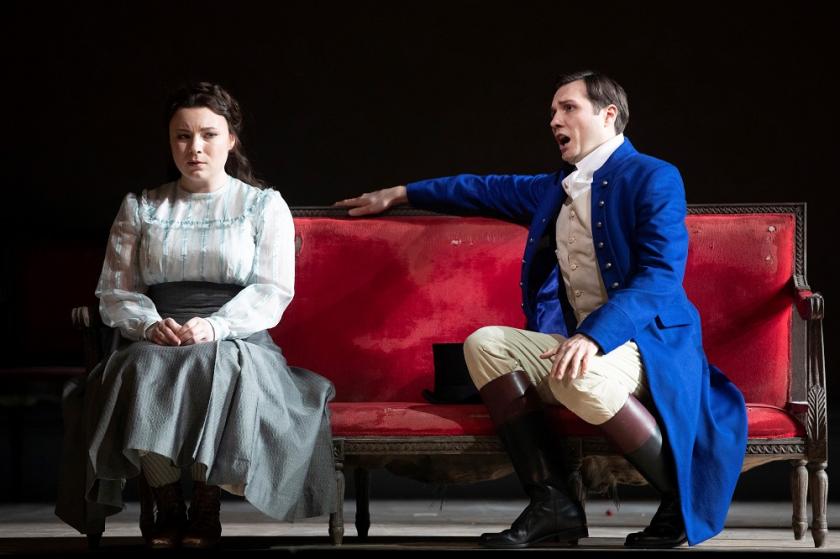It’s 25 years since Tchaikovsky’s Eugene Onegin last came to the Scottish Opera stage, and this brand new production, directed by Oliver Mears, DIrector of Opera at The Royal Opera, gives the stirring score a stately yet elusive grandeur. Based on Alexander Pushkin’s verse-novel of the same name, this tale of unrequited love set against the trappings of class and duty is rooted well within the literary and musical traditions of 19th century Russia, yet easy to immerse oneself in today.
The story is told within the context of female lead Tatyana’s memories from days gone by. Dancer, choreographer and teacher Rosy Sanders plays a version of Tatyana as an old lady, who silently steals through the shadows as she watches the tribulations of her younger self and her sister Olga. Making her Scottish Opera debut, designer Annemarie Woods’s set is therefore deliberately dilapidated, with dusty broken chairs and a mosaic floor and long window shutters that echo faded grandeur (pictured below: Natalya Romaniw as Tatyana in Act III). The chorus are, for the most part, behind a thinly veiled curtain at the back of the stage, and this, combined with Fabiana Picioli’s ingenious lighting design – another debut with the company – makes for a staging that’s atmospherically nostalgic.
 Baritone Samuel Dale Johnson in the title role makes a grand entrance, riding on stage on a horse – yes, an actual horse, which, with perfect comic timing, promptly relieved itself on stage last night, much to the hilarity of many members of the audience. It certainly didn’t dampen Johnson’s dignity, however. He gives an assured performance as the lofty, supercilious Onegin. Soprano Natalya Romaniw is stunning in the role of Tatyana. She sings of her character’s newly discovered love and longing for Onegin with a teetering balance of chaste, blissful innocence and deep sensuality, with supple vocal control.
Baritone Samuel Dale Johnson in the title role makes a grand entrance, riding on stage on a horse – yes, an actual horse, which, with perfect comic timing, promptly relieved itself on stage last night, much to the hilarity of many members of the audience. It certainly didn’t dampen Johnson’s dignity, however. He gives an assured performance as the lofty, supercilious Onegin. Soprano Natalya Romaniw is stunning in the role of Tatyana. She sings of her character’s newly discovered love and longing for Onegin with a teetering balance of chaste, blissful innocence and deep sensuality, with supple vocal control.
Act II begins at a ball, to celebrate Tatyana’s name-day. The chorus, dressed in black, twirl gracefully in couples, still behind the curtain. If one were to nit-pick, the dancing needed to be tighter and more uniform for the silhouette effect to really work. It’s a slight criticism though, and certainly one which pales into comparison when considering the chorus’s mighty vocal prowess displayed throughout the work.
Mezzo-soprano Sioned Gwen Davies is charming as Tatyana's coquettish sister Olga, and Peter Auty gives a magnetic depth to the character of her fiance Lensky. From his bright and lively entrance in Act I to his hot-headed jealousy in Act II, Auty portrays Lensky’s ardent passions with vocal magnitude and a captivating stage presence. His brooding duet as he contemplates his and Onegin’s upcoming duel is rich and heartfelt, with beautifully bubbling obligati from clarinet and oboe.  A host of flickering pillar candles of varying sizes gives a warm glow to the stage for the start of Act III. Johnson plays a now downtrodden and dishevelled Onegin as he laments the shooting of his friend (pictured above). Though the character here has lost the grand stature of his earlier incarnation, vocally this act is where Johnson is at his strongest. His solo singing is rich and resplendent, and his impassioned duet passages with Romaniw tender yet fraught with emotion. Romaniw’s Tatyana here too is transformed from a bookish, youthful country girl to a self-assured aristocrat, but her singing has the same depth, colour and strength throughout. She really is tremendous in this role, taking the audience with her on Tatyana’s emotional journey, through her first discoveries of love, the pain of her rejection, and her ultimate sacrifice of choosing moral duty over her own desires.
A host of flickering pillar candles of varying sizes gives a warm glow to the stage for the start of Act III. Johnson plays a now downtrodden and dishevelled Onegin as he laments the shooting of his friend (pictured above). Though the character here has lost the grand stature of his earlier incarnation, vocally this act is where Johnson is at his strongest. His solo singing is rich and resplendent, and his impassioned duet passages with Romaniw tender yet fraught with emotion. Romaniw’s Tatyana here too is transformed from a bookish, youthful country girl to a self-assured aristocrat, but her singing has the same depth, colour and strength throughout. She really is tremendous in this role, taking the audience with her on Tatyana’s emotional journey, through her first discoveries of love, the pain of her rejection, and her ultimate sacrifice of choosing moral duty over her own desires.
The sounds from the pit were as fervent and passionate as those from the stage. The Scottish Opera orchestra, under Music Director Stuart Stratford, gave a strong performance with high emotional intensity. From poignantly illustrating Tatyana’s sorrows in the first act, they played the dance music at the start of Act II with warmth, but still with zest, and the flurry of strings in the duel scene was anxious and startling. They may not always have been as tightly together as they could have been, but what they lacked in uniformity they more than made up for in animation, vigour and moving musicality.














Add comment